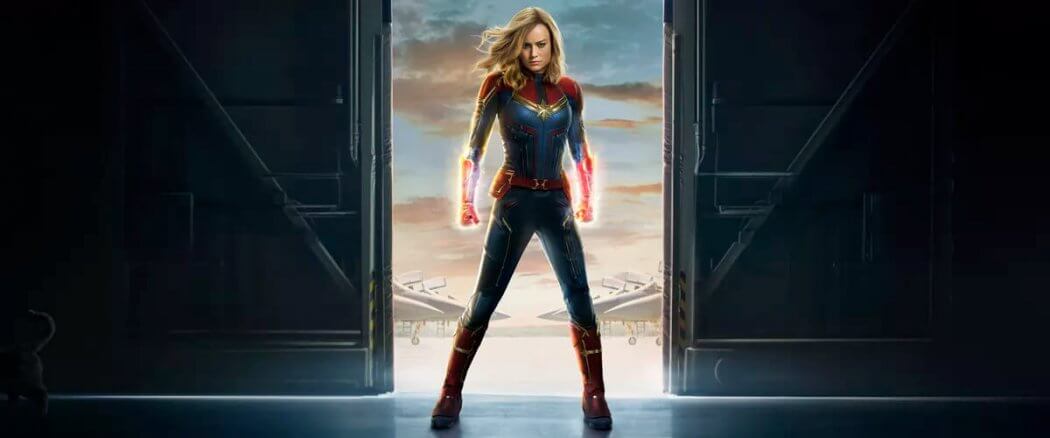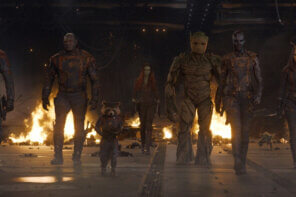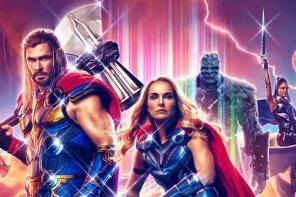As we anxiously wait for the conclusion of ten years of buildup in Avengers: Endgame, Marvel has released Captain Marvel to sate our appetites. Now let us go back to a time before the Avengers, a time known as the 1990s…
A Unique Approach
As the twenty-first film to come from the Marvel Cinematic Universe (MCU), it was possible that Captain Marvel would tread familiar territory when giving Carol Danvers/Captain Marvel’s (played by Brie Larson) origin story. While there are some similarities, her origin is done in a different way from normal, in that she starts out the film with her powers and her origin is revealed as the story progresses. It is not a radical change from the superhero mold, but it is a welcome one.
Carol Danvers starts as a soldier with the Kree, a race of blue-skinned aliens who are at war with the Skrulls, a race of green-skinned shapeshifters. Carol has no memory of her life before joining the Kree, but as the story unfolds, she begins to have flashes of who she was. It is an entertaining journey to watch, especially when Carol finds herself marooned on 1995 Earth, where she encounters Agent Nick Fury (Samuel L. Jackson) and a cat named Goose.
Brie Larson plays off of Samuel L. Jackson well. There are moments where she delivers lines like a straight-faced robot would — see posters and trailers for reference — but Jackson’s Nick Fury brings out a smiling, witty, and human side to Larson’s Carol Danvers.
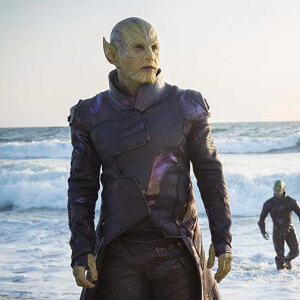 Together, Fury and Danvers unravel the mysteries of Carol’s past and uncover a secret that may affect the fate of the Kree and Skrulls. Along the way, they encounter some subversions and setbacks that are mostly due to the Skrull, Talos (Ben Mendelsohn). Mendelsohn gives one of the best performances of the film here. He has played prideful and arrogant villainous roles in recent films such as Rogue One: A Star Wars Story and Ready Player One, but here Mendelsohn plays a nuanced character who can be cold and brutal one moment, warm and caring another, and also humorous. The more we learn about his motivations and people and how they tie into Carol’s past, the more interesting the story becomes.
Together, Fury and Danvers unravel the mysteries of Carol’s past and uncover a secret that may affect the fate of the Kree and Skrulls. Along the way, they encounter some subversions and setbacks that are mostly due to the Skrull, Talos (Ben Mendelsohn). Mendelsohn gives one of the best performances of the film here. He has played prideful and arrogant villainous roles in recent films such as Rogue One: A Star Wars Story and Ready Player One, but here Mendelsohn plays a nuanced character who can be cold and brutal one moment, warm and caring another, and also humorous. The more we learn about his motivations and people and how they tie into Carol’s past, the more interesting the story becomes.
Sadly, not all of the villains are given such depth, similar to many of the earlier villains in the MCU. Ronan the Accuser (Lee Pace), who was the lead villain in 2014’s Guardians of the Galaxy, plays a role in this story, but unfortunately his character is just as broody and one-dimensional in Captain Marvel as he was in Guardians. And regrettably, the power that he is boasted to have in Guardians never leads him to go toe-to-toe with the powerful Captain Marvel.
Superman Syndrome
Captain Marvel is a powerful superhero, considered to be perhaps the most powerful superhero in the MCU. As such, she runs the risk of suffering from what I like to call Superman Syndrome. Superman is one of the most popular heroes, but he is often portrayed as an all-powerful, perfect being who is then unrelatable to the common man, or he is so powerful that there are no stakes in his story. There are many exceptions in his case, but this is always a danger for characters like this.
Captain Marvel mostly addresses this issue. When we first see Carol in action, she is bound and so must use her wits and reduced strength to get out of her situation. The majority of the rest of the story sees her trying to uncover the mystery of her past as well as making some tough moral decisions. She manages to breeze through many of the challenges in her way, but there are enough twists and reveals that allow the audience to connect with her before she reaches full power.
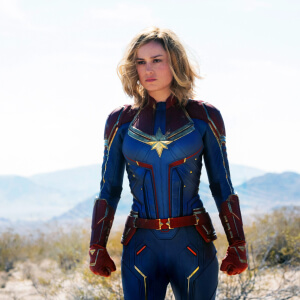 Now, when she reaches full power, it is at first satisfying to watch and then grows into some of the issues of Superman Syndrome. She cuts through enemies like butter. For a moment, there are people’s lives at stake, but once she fixes that issue the final battle is a piece of cake for her. While this may be realistic for her power set, and is certainly different from the climaxes of other superhero movies, it could have benefited from Carol dealing with some greater stakes. This could have been done by either supplying a villain who could actually match her strength or by having some sort of setback, perhaps by further endangering the people or world that Carol is trying to protect. As it stands, the last act of the film feels like it is rushed or missing a piece.
Now, when she reaches full power, it is at first satisfying to watch and then grows into some of the issues of Superman Syndrome. She cuts through enemies like butter. For a moment, there are people’s lives at stake, but once she fixes that issue the final battle is a piece of cake for her. While this may be realistic for her power set, and is certainly different from the climaxes of other superhero movies, it could have benefited from Carol dealing with some greater stakes. This could have been done by either supplying a villain who could actually match her strength or by having some sort of setback, perhaps by further endangering the people or world that Carol is trying to protect. As it stands, the last act of the film feels like it is rushed or missing a piece.
Finding Freedom
On the note of Carol discovering her full potential, this is a great metaphor for what a relationship with God can be like. Carol realizes that she has restraints on her abilities, but once she breaks free from fear and embraces her true self, she literally shines and finds that she has the power to defeat her foes.
God has given us such freedom. We may not be able to fly or shoot photon blasts out of our hands, but we can use this freedom to be a beacon to others, a city on a hill (Matthew 5:14). Not only that, but His freedom allows us to face the enemy and day to day trials with strength and power. We are also free from fear, for He has not given us “[…] a spirit of fear but of power and love and self-control” (2 Timothy 1:7). This freedom can be found if we seek Him first and foremost (Matthew 6:33). In these ways, Captain Marvel is a great example of what spiritual freedom can be like.
Conclusion
Captain Marvel is a fun and strong entry in the MCU, and it sets up some interesting ideas for the upcoming Avengers: Endgame and beyond. There is some uniqueness to Captain Marvel’s story, her relationship with Nick Fury is fun to watch, and one of the main antagonists has an intricacy to him that rivals that of other Marvel villains such as Loki and Thanos. However, Captain Marvel suffers from moments of Superman Syndrome and not every villain is given enough dimension to make them interesting. Overall, Captain Marvel is a good film with the aforementioned moments keeping it from being a great one. That being said, it paves an intriguing path for the MCU going forward.

